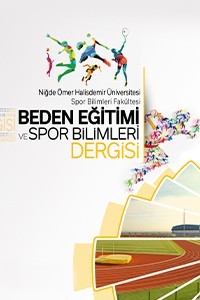SPORCULARDA VE SEDANTER BİREYLERDE AKUT EGZERSİZ ÖNCESİ GLİSEROL TAKVİYESİNİN LAKTAT VE MaxVO2 ÜZERİNE ETKİLERİ
Araştırmada akut egzersiz öncesi uygulanan gliserol takviyesinin sporcularda ve sedanter bireylerde MaxVO2 ve Laktat üzerine etkisinin incelenmesi amaçlanmıştır. Yaş ortalamaları 18.20±0.6110 yıl, boy ortalamaları 178.20±1.7814 cm ve vücut ağırlığı ortalamaları 65.17±2.0488 kg olan elit düzeyde atletizm branşı ile uğraşan 10 sağlıklı erkek sporcu ve yaş ortalamaları 19.70±0.4726 yıl, boy ortalamaları 169,10±2.2184 cm ve vücut ağırlığı ortalamaları 71.09±1.8713 kg olan değişik meslek gruplarından 10 sağlıklı erkek sedanter olmak üzere toplam 20 kişi denek olarak kullanıldı. Her iki gruba 1. gün shuttle run testi öncesi ve hemen sonrası laktat ölçümü için kulak memesinden, kan örnekleri alındı. 2. gün aynı egzersiz testinde 2 saat önce 1 gr/kg gliserol su ile karıştırılarak solisyon halinde her iki gruba verildi ve shuttle run testi uygulandı. Ayrıca her iki gün uygulanan test sonrası her iki grubun MaxVO2 düzeyleri belirlendi. Analizler sonucunda; K ve S Kontrol,Sporcu grubunun ES egzersiz sonrası , MaxVO2 düzeyi TES takviyeli egzersiz sonrası dan önemli p≤0.05 düzeyde yüksek bulunmuştur. S grubunun ES ve TES MaxVo2 düzeyi K grubundan anlamlı düzeyde yüksektir. p≤0.05 . İki grubun her iki egzersiz sonrası ES,TES Laktat parametresi anlamlı p≤0.05 düzeyde artmıştır. K grubunun ES Laktat seviyesi S grubundan önemli p≤0.05 düzeyde yüksek iken TES iki grup arasında istatistiksel bir fark yoktur p≤0.05 . Sonuç; oral olarak uygulanan gliserol takviyesinin MaxVO2 düzeylerine önemli bir etkisinin olduğu fakat Laktat üzerinde en azın bu miktar ve sürede uygulanan gliserol takviyesinin bir etkisinin olmadığı söylenebilir.
EFFECTS OF ACUTE PRE-EXERCISE GLICEROL SUPLEMENTATION ON1LACTATE AND MAXVO2
This study aims to investigate the effects of acute pre-exercise glycerol loading GL onincluding lactate and maximum aerobic power.In this study, 10 healthy elite athletes with a mean age of 18.20±0.61 years, with a mean bodyheight of 178.20±1.78 cms, with a mean body weight of 65.17±2.049 kgs and 10 healthy sedentars fromdifferent profession groups with a mean age of 19.70±0.47 years, with a mean body height of169,10±2.22 cms and with a mean body weight of 71.09±1.87 kgs, totally 20 males were used assubjects.On the first day of the research, blood samples were taken from ear lobe for lactatemeasurement and from analysis before the shuttle run test. On the second day, after loading 1gr/kg-1glycerol mixed with water to the subjects two hours before testing, max VO2was determined by usingshuttle run test in both groups.Statistical analyzes were conducted by SPSS. Mean values of standard deviations werecalculated. The independent t-tests were used to determine the differences between two groups. Also,paired t-tests were performed to determine the differences within groups.Results of this study indicated that max VO2of experiment and control groups were foundhigher after loading at 0.05 significance level. Max VO2of experiment group was significantly higherthan controls. Lactate levels were increased after exercise and GL p
___
- Coutts, A., Reaburn, P., Mummery, K and Holmes, M. The effect of glycerol hyperhydration on olympic distance triathlon performance in high ambient temperatures, Int. J. Sport Nutr. Exerc. Metab, 2002;12 (1): 105-109.
- Coyle F.F. Fluid and Fuel Intake During Exercise, Journal Sports Science. 2004; 22, 39-55.
- Goulet, E.D. Glycerol-induced hyperhydration: a method for estimating the optimal load of fluid to be ingested before exercise to maximize endurance performance. 2010; 4(1):74- 82.
- Landau, B.R. Glycerol Production and Utilization Measured Using Stable Isotopes, Proc Nutr Soc. 1999; (58): 973-978.
- Latzka, W.A., Sawka, M.N. Hyperhydratıon and Glycerol: Thermoregulatory Effects During Exercise in Hot Climates, Can J Appl Physiol. 2000; (25): 536-45.
- Montner, P., Stark, D.M., Riedesel, M.L., Murata, G., Robergs, R., Timms, M and Chick TW. Pre-Exercise Glycerol Hydration Improves Cycling Endurancetime. Int J Sports Med. 1996; (17): 27-33.
- Murray R, Eddy DE, Paul GL, Seifert JG and Halaby GA . Physiological responses to glycerol ingestion during exercise. Am.Physiological Soc.,1991; (1) ,144-149.
- Robergs, R.A,, Griffin, S.E. Glycerol. Biochemistry, Pharmacokinetics and Clinical and Practical Applicaiıons, Sports Medicine. 1998; (8): 145-67.
- Tamer K. Sporda Fiziksel-Fizyolojik Performansın Ölçülmesi ve Değerlendirilmesi, Bağırgan Yayınevi, Ankara. 2000;131-132.
- Wagner, D.R. Hyperhydration with Glycerol; Implications for Athletic Performance, Exercise and Sports Science Department, Vanguard Universty of Southern California Costa Mesa 92626 USA. 1999.
- Van Rosendal, S.P., Osborne, M.A., Fassett, R.G., Coombes, J.S. (2010) Guidelines for
- hyperhydration and rehydration associated with exercise. Sports Med. 2010; 1;40(2):113-29. glycerol
- use in 12. Van Rosendal SP, Strobel NA, Osborne MA, Fassett RG, Coombes JS. Performance Benefits of Rehydration with Intravenous Fluid and Oral Glycerol. Med Sci Sports Exerc. 2012 Mar 26. PMID:22453248,[PubMed - as supplied by publisher].
- Beis LY, Polyviou T, Malkova D, Pitsiladis YP. The effects of creatine and glycerol hyperhydration on running economy in well trained endurance runners. J Int Soc Sports Nutr. 2011 Dec 16;8(1):24.
- ISSN: 1307-6477
- Yayın Aralığı: Yılda 3 Sayı
- Başlangıç: 2007
- Yayıncı: Niğde Ömer Halisdemir Üniversitesi
Sayıdaki Diğer Makaleler
Hamit CİHAN, İbrahim CAN, Mustafa SEYİS
